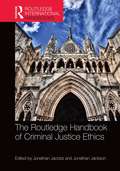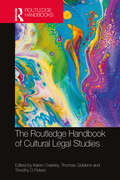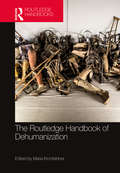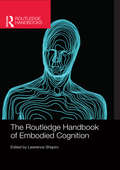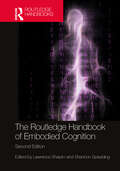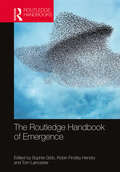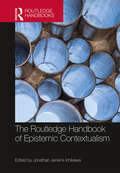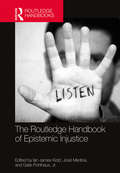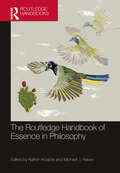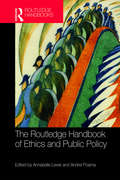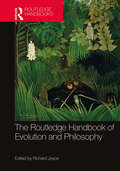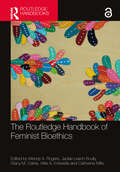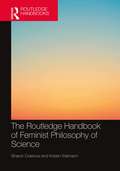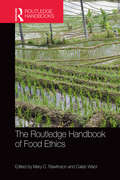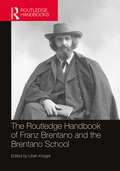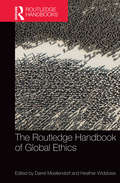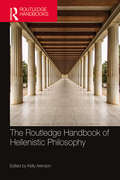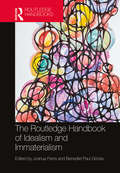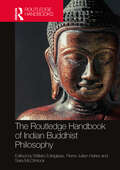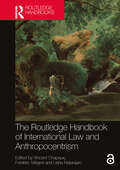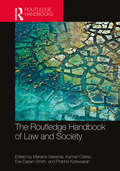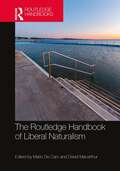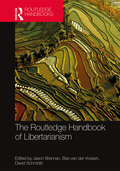- Table View
- List View
The Routledge Handbook of Criminal Justice Ethics (Routledge International Handbooks)
by Jonathan Jacobs Jonathan JacksonThe enormous financial cost of criminal justice has motivated increased scrutiny and recognition of the need for constructive change, but what of the ethical costs of current practices and policies? Moreover, if we seriously value the principles of liberal democracy then there is no question that the ethics of criminal justice are everybody’s business, concerns for the entire society. The Routledge Handbook of Criminal Justice Ethics brings together international scholars to explore the most significant ethical issues throughout their many areas of expertise, anchoring their discussions in the empirical realities of the issues faced rather than applying moral theory at a distance. Contributions from philosophers, legal scholars, criminologists and psychologists bring a fresh and interdisciplinary approach to the field. The Handbook is divided into three parts: Part I addresses the core issues concerning criminal sanction, the moral and political aspects of the justification of punishment, and the relationship between law and morality. Part II examines criminalization and criminal liability, and the assumptions and attitudes shaping those aspects of contemporary criminal justice. Part III evaluates current policies and practices of criminal procedure, exploring the roles of police, prosecutors, judges, and juries and suggesting directions for revising how criminal justice is achieved. Throughout, scholars seek pathways for change and suggest new solutions to address the central concerns of criminal justice ethics. This book is an ideal resource for upper-undergraduate and postgraduate students taking courses in criminal justice ethics, criminology, and criminal justice theory, and also for students of philosophy interested in punishment, law and society, and law and ethics.
The Routledge Handbook of Cultural Legal Studies
by Thomas Giddens Karen Crawley Timothy D PetersThis handbook provides a comprehensive introduction to the cutting-edge field of cultural legal studies.Cultural legal studies is at the forefront of the legal discipline, questioning not only doctrine or social context, but how the concerns of legality are distributed and encountered through a range of material forms. Growing out of the interdisciplinary turn in critical legal studies and jurisprudence that took place in the latter quarter of the 20th century, cultural legal studies exists at the intersection of a range of traditional disciplinary areas: legal studies, cultural studies, literary studies, jurisprudence, media studies, critical theory, history, and philosophy. It is an area of study that is characterised by an expanded or open-ended conception of what ‘counts’ as a legal source, and that is concerned with questions of authority, legitimacy, and interpretation across a wide range of cultural artefacts. Including a mixture of established and new authors in the area, this handbook brings together a complex set of perspectives that are representative of the current field, but which also address its methods, assumptions, limitations, and possible futures.Establishing the significance of the cultural for understanding law, as well as its importance as a potential site for justice, community, and sociality in the world today, this handbook is a key reference point both for those working in the cultural legal context – in legal theory, law and literature, law and film/television, law and aesthetics, cultural studies, and the humanities generally – as well as others interested in the interactions between authority, culture, and meaning.
The Routledge Handbook of Dehumanization (Routledge Handbooks in Philosophy)
by Maria KronfeldnerA striking feature of atrocities, as seen in genocides, civil wars, or violence against certain racial and ethnic groups, is the attempt to dehumanize — to deny and strip human beings of their humanity. Yet the very nature of dehumanization remains relatively poorly understood.The Routledge Handbook of Dehumanization is the first comprehensive and multidisciplinary reference source on the subject and an outstanding survey of the key concepts, issues, and debates within dehumanization studies. Organized into four parts, the Handbook covers the following topics: The history of dehumanization from Greek Antiquity to the 20th century, contextualizing the oscillating boundaries, dimensions, and hierarchies of humanity in the history of the ‘West’; How dehumanization is contemporarily studied with respect to special contexts: as part of social psychology, as part of legal studies or literary studies, and how it connects to the idea of human rights, disability and eugenics, the question of animals, and the issue of moral standing; How to tackle its complex facets, with respect to the perpetrator’s and the target’s perspective, metadehumanization and selfdehumanization, rehumanization, social death, status and interdependence, as well as the fear we show toward robots that become too human for us; Conceptual and epistemological questions on how to distinguish different forms of dehumanization and neighboring phenomena, on why dehumanization appears so paradoxical, and on its connection to hatred, essentialism, and perception. Essential reading for students and researchers in philosophy, history, psychology, and anthropology, this Handbook will also be of interest to those in related disciplines, such as politics, international relations, criminology, legal studies, literary studies, gender studies, disability studies, or race and ethnic studies, as well as readers from social work, political activism, and public policy.
The Routledge Handbook of Embodied Cognition (Routledge Handbooks in Philosophy)
by Lawrence ShapiroEmbodied cognition is one of the foremost areas of study and research in philosophy of mind, philosophy of psychology and cognitive science. The Routledge Handbook of Embodied Cognition is an outstanding guide and reference source to the key topics and debates in this exciting subject and essential reading for any student and scholar of philosophy of mind and cognitive science. Comprising over thirty chapters by a team of international contributors, the Handbook is divided into six parts: Historical underpinnings Perspectives on embodied cognition Applied embodied cognition: perception, language, and reasoning Applied embodied cognition: social and moral cognition and emotion Applied embodied cognition: memory, attention, and group cognition Meta-topics. The early chapters of the Handbook cover empirical and philosophical foundations of embodied cognition, focusing on Gibsonian and phenomenological approaches. Subsequent chapters cover additional, important themes common to work in embodied cognition, including embedded, extended and enactive cognition as well as chapters on empirical research in perception, language, reasoning, social and moral cognition, emotion, consciousness, memory, and learning and development.
The Routledge Handbook of Embodied Cognition (Routledge Handbooks in Philosophy)
by Lawrence Shapiro Shannon SpauldingEmbodied cognition is one of the foremost areas of study and research in philosophy of mind, philosophy of psychology, and cognitive science. The Routledge Handbook of Embodied Cognition is an outstanding guide and reference source to the key topics and debates in this exciting subject and essential reading for any student and scholar of philosophy of mind and cognitive science.Extensively revised and enlarged for this second edition, the Handbook comprises 42 chapters by an international team of expert contributors and is divided into ten parts: Historical Underpinnings Perspectives on Embodied Cognition Embodied Cognition and Predictive Processing Perception Language Reasoning and Education Virtual Reality Social and Moral Cognition and Emotion Action and Memory Reflections on Embodied Cognition The early chapters of the Handbook cover empirical and philosophical foundations of embodied cognition, focusing on Gibsonian and phenomenological approaches. Subsequent chapters cover additional, important themes common to work in embodied cognition, including embedded, extended, and enactive cognition as well as chapters on empirical research in perception, language, reasoning, social and moral cognition, emotion, consciousness, memory, and learning and development.For the second edition many existing chapters have been revised and seven new chapters added on: AI and robotics, predictive processing, second-language learning, animal cognition, sport psychology, sense of self, and critiques of embodied cognition, bringing the Handbook fully up to date with current research and debate.
The Routledge Handbook of Emergence (Routledge Handbooks in Philosophy)
by Sophie Gibb Robin Findlay Hendry Tom LancasterEmergence is often described as the idea that the whole is greater than the sum of the parts: interactions among the components of a system lead to distinctive novel properties. It has been invoked to describe the flocking of birds, the phases of matter and human consciousness, along with many other phenomena. Since the nineteenth century, the notion of emergence has been widely applied in philosophy, particularly in contemporary philosophy of mind, philosophy of science and metaphysics. It has more recently become central to scientists’ understanding of phenomena across physics, chemistry, complexity and systems theory, biology and the social sciences. The Routledge Handbook of Emergence is an outstanding reference source and exploration of the concept of emergence, and is the first collection of its kind. Thirty-two chapters by an international team of contributors are organised into four parts: Foundations of emergence Emergence and mind Emergence and physics Emergence and the special sciences Within these sections important topics and problems in emergence are explained, including the British Emergentists; weak vs. strong emergence; emergence and downward causation; dependence, complexity and mechanisms; mental causation, consciousness and dualism; quantum mechanics, soft matter and chemistry; and evolution, cognitive science and social sciences. Essential reading for students and researchers in philosophy of mind, philosophy of science and metaphysics, The Routledge Handbook of Emergence will also be of interest to those studying foundational issues in biology, chemistry, physics and psychology.
The Routledge Handbook of Epistemic Contextualism (Routledge Handbooks in Philosophy)
by Jonathan Jenkins IchikawaEpistemic contextualism is a recent and hotly debated topic in philosophy. Contextualists argue that the language we use to attribute knowledge can only be properly understood relative to a specified context. How much can our knowledge depend on context? Is there a limit, and if so, where does it lie? What is the relationship between epistemic contextualism and fundamental topics in philosophy such as objectivity, truth, and relativism? The Routledge Handbook of Epistemic Contextualism is an outstanding reference source to the key topics, problems, and debates in this exciting subject and is the first collection of its kind. Comprising thirty-seven chapters by a team of international contributors the Handbook is divided into eight parts: Data and motivations for contextualism Methodological issues Epistemological implications Doing without contextualism Relativism and disagreement Semantic implementations Contextualism outside ‘knows’ Foundational linguistic issues. Within these sections central issues, debates and problems are examined, including contextualism and thought experiments and paradoxes such as the Gettier problem and the lottery paradox; semantics and pragmatics; the relationship between contextualism, relativism, and disagreement; and contextualism about related topics like ethical judgments and modality. The Routledge Handbook of Epistemic Contextualism is essential reading for students and researchers in epistemology and philosophy of language. It will also be very useful for those in related fields such as linguistics and philosophy of mind.
The Routledge Handbook of Epistemic Injustice (Routledge Handbooks in Philosophy)
by José Medina Gaile Pohlhaus Jr. Ian James KiddIn the era of information and communication, issues of misinformation and miscommunication are more pressing than ever. Epistemic injustice - one of the most important and ground-breaking subjects to have emerged in philosophy in recent years - refers to those forms of unfair treatment that relate to issues of knowledge, understanding, and participation in communicative practices. The Routledge Handbook of Epistemic Injustice is an outstanding reference source to the key topics, problems and debates in this exciting subject. The first collection of its kind, it comprises over thirty chapters by a team of international contributors, divided into five parts: Core Concepts Liberatory Epistemologies and Axes of Oppression Schools of Thought and Subfields within Epistemology Socio-political, Ethical, and Psychological Dimensions of Knowing Case Studies of Epistemic Injustice. As well as fundamental topics such as testimonial and hermeneutic injustice and epistemic trust, the Handbook includes chapters on important issues such as social and virtue epistemology, objectivity and objectification, implicit bias, and gender and race. Also included are chapters on areas in applied ethics and philosophy, such as law, education, and healthcare. The Routledge Handbook of Epistemic Injustice is essential reading for students and researchers in ethics, epistemology, political philosophy, feminist theory, and philosophy of race. It will also be very useful for those in related fields, such as cultural studies, sociology, education and law.
The Routledge Handbook of Essence in Philosophy (Routledge Handbooks in Philosophy)
by Michael J. Raven Kathrin KoslickiEssences have been assigned important but controversial explanatory roles in philosophical, scientific, and social theorizing. Is it possible for the same organism to be first a caterpillar and then a butterfly? Is it impossible for a human being to transform into an insect like Gregor Samsa does in Kafka’s The Metamorphosis? Is it impossible for Lot’s wife to survive being turned into a pillar of salt? Traditionally, essences (or natures) have been thought to help answer such central questions about existence, identity, persistence, and modality. These questions are not only of great philosophical interest, they also are of great interest to society at large.This Handbook surveys the state of the art on essence. Core issues about essence are discussed in 33 chapters, all of them written exclusively for this volume by leading experts. They are organized into the following four major parts, each with its own introduction that provides a summary and comparison of the part’s chapters: History Essence and Essentialisms: Themes and Variations Applications Anti-Essentialist Challenges. The volume is accessible enough for students while also providing enough details to make it a valuable reference for researchers.While the notion of essence has been targeted for sustained criticisms since antiquity, recent work has renewed interest in the topic. This Handbook explains and synthesizes much of this current interest, placing essence within its historical context and drawing connections to many contemporary areas of philosophy as well as to scholarly work in other disciplines. With cross-references in each chapter and a comprehensive index, The Routledge Handbook of Essence in Philosophy is a useful resource and essential reading for anyone, whether in or out of academic philosophy, seeking clarification on one of philosophy’s most distinctive and notorious notions.
The Routledge Handbook of Ethics and Public Policy (Routledge Handbooks in Applied Ethics)
by Annabelle Lever Andrei PoamaWhat does it mean to do public policy ethics today? How should philosophers engage with ethical issues in policy-making when policy decisions are circumscribed by political and pragmatic concerns? How do ethical issues in public policy differ between areas such as foreign policy, criminal justice, or environmental policy? The Routledge Handbook of Ethics and Public Policy addresses all these questions and more, and is the first handbook of its kind. It is comprised of 41 chapters written by leading international contributors, and is organised into four clear sections covering the following key topics: Methodology: philosophical approaches to public policy, ethical expertise, knowledge, and public policy Democracy and public policy: identity, integration and inclusion: voting, linguistic policy, discrimination, youth policy, religious toleration, and the family Public goods: defence and foreign policy, development and climate change, surveillance and internal security, ethics of welfare, healthcare and fair trade, sovereignty and territorial boundaries, and the ethics of nudging Public policy challenges: criminal justice, policing, taxation, poverty, disability, reparation, and ethics of death policies. The Routledge Handbook of Ethics and Public Policy is essential reading for students and researchers in philosophy, politics, and social policy. It will be equally useful to those in related disciplines, such as economics and law, or professional fields, such as business administration or policy-making in general.
The Routledge Handbook of Evolution and Philosophy (Routledge Handbooks in Philosophy)
by Richard JoyceIn recent years, the relation between contemporary academic philosophy and evolutionary theory has become ever more active, multifaceted, and productive. The connection is a bustling two-way street. In one direction, philosophers of biology make significant contributions to theoretical discussions about the nature of evolution (such as "What is a species?"; "What is reproductive fitness?"; "Does selection operate primarily on genes?"; and "What is an evolutionary function?"). In the other direction, a broader group of philosophers appeal to Darwinian selection in an attempt to illuminate traditional philosophical puzzles (such as "How could a brain-state have representational content?"; "Are moral judgments justified?"; "Why do we enjoy fiction?"; and "Are humans invariably selfish?"). In grappling with these questions, this interdisciplinary collection includes cutting-edge examples from both directions of traffic. The thirty contributions, written exclusively for this volume, are divided into six sections: The Nature of Selection; Evolution and Information; Human Nature; Evolution and Mind; Evolution and Ethics; and Evolution, Aesthetics, and Art. Many of the contributing philosophers and psychologists are international leaders in their fields.
The Routledge Handbook of Feminist Bioethics (Routledge Handbooks in Applied Ethics)
by Jackie Leach Scully Catherine Mills Wendy A. Rogers Stacy M. Carter Vikki A. EntwistleThe Routledge Handbook of Feminist Bioethics is an outstanding resource for anyone with an interest in feminist bioethics, with chapters covering topics from justice and power to the climate crisis. Comprising forty-two chapters by emerging and established scholars, the volume is divided into six parts: I Foundations of feminist bioethics II Identity and identifications III Science, technology and research IV Health and social care V Reproduction and making families VI Widening the scope of feminist bioethics The volume is essential reading for anyone with an interest in bioethics or feminist philosophy, and will prove an invaluable resource for scholars, teachers and advanced students
The Routledge Handbook of Feminist Philosophy of Science (Routledge Handbooks in Philosophy)
by Sharon CrasnowThe Routledge Handbook of Feminist Philosophy of Science is a comprehensive resource for feminist thinking about and in the sciences. Its 33 chapters were written exclusively for this Handbook by a group of leading international philosophers as well as scholars in gender studies, women’s studies, psychology, economics, and political science. The chapters of the Handbook are organized into four main parts: I. Hidden Figures and Historical Critique II. Theoretical Frameworks III. Key Concepts and Issues IV. Feminist Philosophy of Science in Practice. The chapters in this extensive, fourth part examine the relevance of feminist philosophical thought for a range of scientific and professional disciplines, including biology and biomedical sciences; psychology, cognitive science, and neuroscience; the social sciences; physics; and public policy. The Handbook gives a snapshot of the current state of feminist philosophy of science, allowing students and other newcomers to get up to speed quickly in the subfield and providing a handy reference for many different kinds of researchers.
The Routledge Handbook of Feminist Philosophy of Science (Routledge Handbooks in Philosophy)
by Sharon CrasnowThe Routledge Handbook of Feminist Philosophy of Science is a comprehensive resource for feminist thinking about and in the sciences. Its 33 chapters were written exclusively for this Handbook by a group of leading international philosophers as well as scholars in gender studies, women’s studies, psychology, economics, and political science.The chapters of the Handbook are organized into four main parts: I. Hidden Figures and Historical CritiqueII. Theoretical FrameworksIII. Key Concepts and IssuesIV. Feminist Philosophy of Science in Practice.The chapters in this extensive, fourth part examine the relevance of feminist philosophical thought for a range of scientific and professional disciplines, including biology and biomedical sciences; psychology, cognitive science, and neuroscience; the social sciences; physics; and public policy. The Handbook gives a snapshot of the current state of feminist philosophy of science, allowing students and other newcomers to get up to speed quickly in the subfield and providing a handy reference for many different kinds of researchers.
The Routledge Handbook of Food Ethics (Routledge Handbooks in Applied Ethics)
by Mary Rawlinson Caleb WardWhile the history of philosophy has traditionally given scant attention to food and the ethics of eating, in the last few decades the subject of food ethics has emerged as a major topic, encompassing a wide array of issues, including labor justice, public health, social inequity, animal rights and environmental ethics. This handbook provides a much needed philosophical analysis of the ethical implications of the need to eat and the role that food plays in social, cultural and political life. Unlike other books on the topic, this text integrates traditional approaches to the subject with cutting edge research in order to set a new agenda for philosophical discussions of food ethics. The Routledge Handbook of Food Ethics is an outstanding reference source to the key topics, problems and debates in this exciting subject and is the first collection of its kind. Comprising over 35 chapters by a team of international contributors, the Handbook is divided into 7 parts: the phenomenology of food gender and food food and cultural diversity liberty, choice and food policy food and the environment farming and eating other animals food justice Essential reading for students and researchers in food ethics, it is also an invaluable resource for those in related disciplines such as environmental ethics and bioethics.
The Routledge Handbook of Franz Brentano and the Brentano School (Routledge Handbooks in Philosophy)
by Uriah KriegelBoth through his own work and that of his students, Franz Clemens Brentano (1838–1917) had an often underappreciated influence on the course of twentieth- and twenty-first-century philosophy. The Routledge Handbook of Franz Brentano and the Brentano School offers full coverage of Brentano’s philosophy and his influence. It contains 38 brand-new essays from an international team of experts that offer a comprehensive view of Brentano’s central research areas—philosophy of mind, metaphysics, and value theory—as well as of the principal figures shaped by Brentano’s school of thought. A general introduction serves as an overview of Brentano and the contents of the volume, and three separate bibliographies point students and researchers on to further avenues of inquiry. Systematic and detailed, The Routledge Handbook of Franz Brentano and the Brentano School provides readers with a valuable reference to Brentano’s work and to his lasting importance in the history of philosophy and in contemporary debates.
The Routledge Handbook of Global Ethics (Routledge Handbooks in Applied Ethics)
by Heather Widdows Darrel MoellendorfGlobal ethics focuses on the most pressing contemporary ethical issues - poverty, global trade, terrorism, torture, pollution, climate change and the management of scarce recourses. It draws on moral and political philosophy, political and social science, empirical research, and real-world policy and activism. The Routledge Handbook of Global Ethics is an outstanding reference source to the key topics, problems and debates in this exciting subject, presenting an authoritative overview of the most significant issues and ideas in global ethics. The 31 chapters by a team of international contributors are structured into six key parts: normative theory conflict and violence poverty and development economic justice bioethics and health justice environment and climate ethics. Covering the theoretical and practical aspects of global ethics as well as policy, The Routledge Handbook of Philosophy of Global Ethics provides a benchmark for the study of global ethics to date, as well as outlining future developments. It will prove an invaluable reference for policy-makers, and is essential reading for students and researchers in philosophy, international relations, political science, environmental and development studies and human rights law.
The Routledge Handbook of Hellenistic Philosophy (Routledge Handbooks in Philosophy)
by Kelly ArensonHellenistic philosophy concerns the thought of the Epicureans, Stoics, and Skeptics, the most influential philosophical groups in the era between the death of Alexander the Great (323 BCE) and the defeat of the last Greek stronghold in the ancient world (31 BCE). The Routledge Handbook of Hellenistic Philosophy provides accessible yet rigorous introductions to the theories of knowledge, ethics, and physics belonging to each of the three schools, explores the fascinating ways in which interschool rivalries shaped the philosophies of the era, and offers unique insight into the relevance of Hellenistic views to issues today, such as environmental ethics, consumerism, and bioethics. Eleven countries are represented among the Handbook’s 35 authors, whose chapters were written specifically for this volume and are organized thematically into six sections: The people, history, and methods of Epicureanism, Stoicism, and Skepticism. Earlier philosophical influences on Hellenistic thought, such as Aristotle, Socrates, and Presocratics. The soul, perception, and knowledge. God, fate, and the primary principles of nature and the universe. Ethics, political theory, society, and community. Hellenistic philosophy’s relevance to contemporary life. Spanning from the ancient past to the present, this Handbook aims to show that Hellenistic philosophy has much to offer all thinking people of the twenty-first century.
The Routledge Handbook of Hellenistic Philosophy (Routledge Handbooks in Philosophy)
by Kelly ArensonHellenistic philosophy concerns the thought of the Epicureans, Stoics, and Skeptics, the most influential philosophical groups in the era between the death of Alexander the Great (323 BCE) and the defeat of the last Greek stronghold in the ancient world (31 BCE). The Routledge Handbook of Hellenistic Philosophy provides accessible yet rigorous introductions to the theories of knowledge, ethics, and physics belonging to each of the three schools, explores the fascinating ways in which interschool rivalries shaped the philosophies of the era, and offers unique insight into the relevance of Hellenistic views to issues today, such as environmental ethics, consumerism, and bioethics. Eleven countries are represented among the Handbook’s 35 authors, whose chapters were written specifically for this volume and are organized thematically into six sections: The people, history, and methods of Epicureanism, Stoicism, and Skepticism. Earlier philosophical influences on Hellenistic thought, such as Aristotle, Socrates, and Presocratics. The soul, perception, and knowledge. God, fate, and the primary principles of nature and the universe. Ethics, political theory, society, and community. Hellenistic philosophy’s relevance to contemporary life. Spanning from the ancient past to the present, this Handbook aims to show that Hellenistic philosophy has much to offer all thinking people of the twenty-first century.
The Routledge Handbook of Idealism and Immaterialism (Routledge Handbooks in Philosophy)
by Benedikt Paul Göcke Joshua FarrisThe influence of materialist ontology largely dominates philosophical and scientific discussions. However, there is a resurgent interest in alternative ontologies from panpsychism (the view that at the base of reality exists potential minds, minds, or mind-lets) to idealism and dualism (the view that all of reality is material and mental). The Routledge Handbook of Idealism and Immaterialism is an outstanding reference source and the first major collection of its kind. Historically grounded and constructively motivated, it covers the key topics in philosophy, science, and theology, providing students and scholars with a comprehensive introduction to idealism and immaterialism. Also addressed are post-materialism developments, with explicit attention to variations of idealism and immaterialism (the view that reality depends on a mind or a set of minds). Comprising 44 chapters written by an international and interdisciplinary team of contributors, the Handbook is organised into five clear parts: Idealism and the history of philosophy Important figures in idealism Systematic assessment of idealism Idealism and science Idealism, physicalism, panpsychism, and substance dualism Essential reading for students and researchers in metaphysics, philosophy of science, philosophy of religion, and philosophy of mind, The Routledge Handbook of Idealism and Immaterialism will also be of interest to those in related discplines where idealist and immaterialist ontology impinge on history, science, and theology.
The Routledge Handbook of Indian Buddhist Philosophy (Routledge Handbooks in Philosophy)
by Pierre-Julien Harter William Edelglass Sara McClintockThe Routledge Handbook of Indian Buddhist Philosophy is the first scholarly reference volume to highlight the diversity and individuality of a large number of the most influential philosophers to have contributed to the evolution of Buddhist thought in India. By placing the author at the center of inquiry, the volume highlights the often unrecognized innovation and multiplicity of India’s Buddhist thinkers, whose unique contributions are commonly subsumed in more general doctrinal presentations of philosophical schools. Here, instead, the reader is invited to explore the works and ideas of India’s most important Buddhist philosophers in a manner that takes seriously the weight of their philosophical thought. The forty chapters by an international and interdisciplinary team of renowned contributors each seek to offer both a wide-ranging overview and a philosophically astute reading of the works of the most seminal Indian Buddhist authors from the earliest writings to the twentieth century. The volume thus also provides thorough coverage of all the main figures, texts, traditions, and debates animating Indian Buddhist thought, and as such can serve as an in-depth introduction to Buddhist philosophy in India for those new to the field. Essential reading for students and researchers in Asian and comparative philosophy, The Routledge Handbook of Indian Buddhist Philosophy is also an excellent resource for specialists in Buddhist philosophy, as well as for contemporary philosophers interested in learning about the rigorous and rich traditions of Buddhist philosophy in India.
The Routledge Handbook of International Law and Anthropocentrism
by Vincent Chapaux, Frédéric Mégret and Usha NatarajanThis handbook explores, contextualises and critiques the relationship between anthropocentrism – the idea that human beings are socially and politically at the centre of the cosmos – and international law. While the critical study of anthropocentrism has been under way for several years, it has either focused on specific subfields of international law or emanated from two distinctive strands inspired by the animal rights movement and deep ecology. This handbook offers a broader study of anthropocentrism in international law as a global legal system and academic field. It assesses the extent to which current international law is anthropocentric, contextualises that claim in relation to broader critical theories of anthropocentrism, and explores alternative ways for international law to organise relations between humans and other living and non-living entities. This book will interest international lawyers, environmental lawyers, legal theorists, social theorists, and those concerned with the philosophy and ethics of ecology and the non-human realms.
The Routledge Handbook of Law and Society
by Mariana Valverde Prabha Kotiswaran Eve Darian-Smith Kamari ClarkeThis innovative handbook provides a comprehensive, and truly global, overview of the main approaches and themes within law and society scholarship or social-legal studies. A one-volume introduction to academic resources and ideas that are relevant for today’s debates on issues from reproductive justice to climate justice, food security, water conflicts, artificial intelligence, and global financial transactions, this handbook is divided into two sections. The first, ‘Perspectives and Approaches’, accessibly explains a variety of frameworks through which the relationship between law and society is addressed and understood, with emphasis on contemporary perspectives that are relatively new to many socio-legal scholars. Following the book’s overall interest in social justice, the entries in this section of the book show how conceptual tools originate in, and help to illuminate, real-world issues. The second and largest section of the book (42 short well-written pieces) presents reflections on topics or areas concerning law, justice, and society that are inherently interdisciplinary and that are relevance to current – but also classical – struggles around justice. Informing readers about the lineage of ideas that are used or could be used today for research and activism, the book attends to the full range of local, national and transnational issues in law and society. The authors were carefully chosen to achieve a diverse and non-Eurocentric view of socio-legal studies. This volume will be invaluable for law students, those in inter-disciplinary programs such as law and society, justice studies and legal studies, and those with interests in law, but based in other social sciences. It will also appeal to general readers interested in questions of justice and rights, including activists and advocates around the world.
The Routledge Handbook of Liberal Naturalism (Routledge Handbooks in Philosophy)
by Mario De CaroThe central question of naturalism - the relation of philosophy to science - was one of the defining strands of twentieth-century thought and remains a major source of debate and controversy. Today many argue that philosophy should fold itself into the sciences, especially the natural sciences. Liberal naturalists argue that such scientific naturalism demands reductive and Procrustean conceptions of knowledge and reality. Moreover, many philosophical problems are beyond the scope of the sciences, such as the nature of persons, the normativity of the space of reasons, and how best to understand the peculiar mix of objectivity and subjectivity of ethics and art. The Routledge Handbook of Liberal Naturalism is the first collection to present a comprehensive overview of liberal naturalism, a philosophical outlook that lies between scientific naturalism and supernaturalism. Comprising 37 chapters by an international team of contributors, it examines important cutting-edge topics including: what is liberal naturalism? is metaphysics a viable project? naturalism in the history of philosophy, including Hume, Dewey, and Quine contemporary liberal naturalists such as P.F. Strawson, John McDowell, Hilary Putnam, and John Rawls related kinds of naturalism, including subject naturalism, common-sense naturalism and biological naturalism the bearing of liberal naturalism on contemporary debates in epistemology, philosophy of mind, ethics and aesthetics. Essential reading for students and researchers in all areas of philosophy, this volume will be of particular interest for those studying philosophical naturalism, philosophy of science, metaphysics, epistemology, philosophy of mind, ethics and aesthetics.
The Routledge Handbook of Libertarianism (Routledge Handbooks in Philosophy)
by Jason Brennan David Schmidtz Bas van der VossenLibertarians often bill their theory as an alternative to both the traditional Left and Right. The Routledge Handbook of Libertarianism helps readers fully examine this alternative without preaching it to them, exploring the contours of libertarian (sometimes also called classical liberal) thinking on justice, institutions, interpersonal ethics, government, and political economy. The 31 chapters--all written specifically for this volume--are organized into five parts. Part I asks, what should libertarianism learn from other theories of justice, and what should defenders of other theories of justice learn from libertarianism? Part II asks, what are some of the deepest problems facing libertarian theories? Part III asks, what is the right way to think about property rights and the market? Part IV asks, how should we think about the state? Finally, part V asks, how well (or badly) can libertarianism deal with some of the major policy challenges of our day, such as immigration, trade, religion in politics, and paternalism in a free market. Among the Handbook's chapters are those from critics who write about what they believe libertarians get right as well as others from leading libertarian theorists who identify what they think libertarians get wrong. As a whole, the Handbook provides a comprehensive, clear-eyed look at what libertarianism has been and could be, and why it matters.
